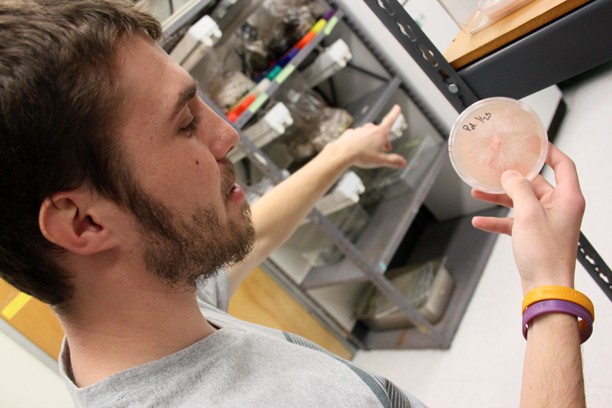Stereotypically, the mushroom is affiliated with smoke shops and hippie caravans. Scientifically, it is a fungus. On the UA campus, it is a key to sustainable research.
Barry Pryor, a mycologist and professor of plant sciences, is conducting an extensive research project using mushrooms to enhance the sustainability of food systems, and he’s keeping the project local.
“We’re trying to incorporate the use of some of these edible mushrooms in a decomposition-based, recycling, sustainable system,” Pryor said. “We’re providing nutritional food for college students, health promoting and delicious food, while at the same time helping recycle some of the common waste generated on a college campus.”
This waste, including pizza boxes, coffee grounds, mesquite pods and newspapers, is being used to grow the mushrooms.
The mushroom project exists to grow local sustainability, the primary goal being to turn waste products into soil for food production.
Mushrooms are decomposers in nature, breaking down materials like Starbucks cups and coffee grounds to form nutrient-rich soil from which other organisms may grow. The mushroom project creates opportunities to recycle degradable materials while imbuing soil with higher concentrations of nutrients — and where there’s richer soil, there’s more food.
“It’s really the missing step in our food system right now,” research assistant Parker Evans said. “We have all these very defined ways to grow crops. We have all these very important ways to process things, and so everything is just entirely processed. We need a way to get a Starbucks cup back to wood, and how do I do that? Mushrooms.”
Yes, mushrooms. The team of researchers in Pryor’s laboratory is harvesting both edible and medicinal mushrooms for environmental change. These mushrooms are not hallucinogens, but they are altering the vision of sustainable practices for this generation.
UA composting organization Compost Cats is an active participant in the mushroom project, Pryor said. By collecting coffee grounds from campus locations and Starbucks, Compost Cats is providing the literal grounds for mushroom growth.
Introduced to the university in the fall of 2012 by graduate student Lauren Jackson, the mushroom project began as an investigation into the ability of medicinal mushrooms to facilitate sustainable methods in an increasingly overpopulated and over-processed world.
Mushrooms, it seems, can serve a greater purpose than just topping your pizza.
“Mushrooms provide a lot of nutritional benefits in our diet,” Pryor said, “mainly in regards to health-promoting qualities such as cholesterol reduction, hypertension reduction, antitumor properties, anti-inflammatory properties and many properties that lead to increased longevity.”
Jackson said mushrooms are relatively unexplored in Western cultures, despite their many superfood qualities. They work effectively as a protein supplement, and have been traced to potentially cancer-curing research in Japan.
In America, however, mushrooms are underappreciated.
“A lot of people, when they think mushrooms, they think of poison, or hallucinating, or button mushrooms at the store. People just aren’t familiar with them,” Jackson said.
The mushroom project is striving to make known the viability of mushrooms as an efficient food source, and dispel some of the negative assumptions surrounding the fungi.
The mushroom project also exists in an age where food production is a growing concern. Earth is exponentially surpassing its carrying capacity with a relative population of 8 billion, according to Jackson. Nine billion people are expected to populate the planet by the year 2050. Currently, more than 1 billion people are considered to be going hungry.
How do we feed more people with less land? Implementing a sustainable future requires building from the ground up, and in Pryor’s laboratory, that means starting with mushrooms.
“We’re going to have 9 billion people on the planet and you’re going to keep processing Starbucks cups and throwing them in ditches?” Evans said. “You can’t feed 9 billion people without mushrooms.”









